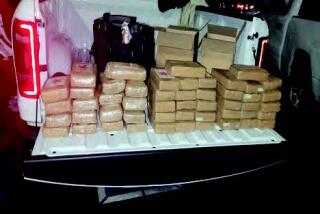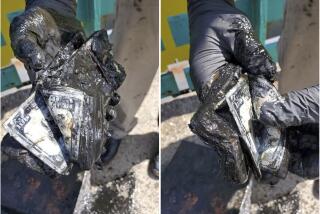Prevalence of Drug-Tainted Money Voids Case : Law: Court cites findings that more than 75% of currency in L.A. bears traces of cocaine or other illegal substances.
- Share via
More than three-quarters of all the paper money in Los Angeles has some amount of cocaine or some other drug stuck to it, according to a federal appeals court decision that vividly illuminates how extensively the drug trade touches mainstream commerce.
On the average, of every four bills in circulation in Los Angeles, more than three have traces of cocaine or another illicit drug stuck to the paper, according to the U.S. 9th Circuit Court of Appeals, which relied on that fact to dismiss a case against a man suspected of drug trafficking.
In powdered form, the court said, cocaine is so sticky that a bit remains when a drug dealer wraps it in a bill folded like an envelope or a user snorts it through a dollar used as a makeshift straw. As that bill is pressed against another in a wallet or combined with others in a bank or cash register, other bills get contaminated, too.
That means, the court said, that virtually everyone in Los Angeles is conceivably at risk of being barked at by drug-sniffing police dogs.
“The bottom line,” said Sherman Oaks attorney Jerold L. Bloom, who defended an Inglewood man carrying $30,060 that prosecutors charged was drug money, “is that anyone with tainted currency can be stopped and alleged to be a drug dealer. That’s guilt by association.”
The notion that most U.S. currency is tainted with drugs has been well known in law enforcement and scientific circles for about 10 years. However, the 9th Circuit decision, issued Tuesday by the San Francisco-based court, underscores just how amazingly widespread the tainting has become.
Because it is so widespread, the court ruled, the ability of police and prosecutors to rely in court on a “positive alert” from a drug-sniffing dog will now be seriously diminished--a serious drawback in cases in which authorities have seized cash and the federal government is seeking the forfeiture of drug money.
Such an alert used to be strong evidence that a person bought or intended to buy drugs. No more, the court said, ordering police officers to show other evidence “clearly connecting the money to drugs.”
Officials with the Los Angeles County Sheriff’s Department, which made the traffic stop that led to the ruling, said they plan to meet this week with federal authorities to “discuss what impact this may have on us,” said Lt. Bob Hoffman of the department’s narcotics detail.
The Inglewood case began April 24, 1990, when deputies stopped a car driven by Albert Joseph Alexander, then 30, near 107th Street and Denker Avenue. Deputies alleged that he had run a stop sign.
On the front seat was a plastic bag filled with $30,060. The money was arranged in $1,000 stacks bound by rubber bands; it was made up of $5, $10, $20, $50 and $100 bills.
Alexander, a mechanic, said last week that he had plans to buy into a friend’s trucking business and was carrying the cash to that meeting.
“I didn’t have no reason to hide it,” he said of the money.
Deputies used a dog, who sensed drugs in the bag of money. They searched Alexander and his car for drugs, but found none.
State criminal charges were dismissed. But in a proceeding in the civil courts, federal prosecutors sought to keep the $30,060 as drug money.
Alexander’s attorney Bloom argued that there was not enough evidence to connect the money to drugs, as the law requires. In April, 1992, U.S. District Judge Ronald S.W. Lew agreed. Prosecutors appealed to the 9th Circuit.
In its decision, the appeals court relied on uncontradicted evidence that more than three of every four bills circulating in Los Angeles were tainted with drug residue.
That evidence was provided by Ojai-based forensic toxicologist Jay B. Williams, who said he had done numerous studies since 1982 that turned up drugs on samples of $1, $2, $5, $10, $20, $50 and $100 bills taken from throughout the West--from banks, casinos, stores and restaurants.
Williams, who has specialized in drug and alcohol tests for 27 years, said last week that the percentage of contaminated bills ranged from 15% in Bozeman, Mont., to a little more than 75% in Los Angeles and Las Vegas.
The bills he tested contained quantities of cocaine as small as a nanogram, meaning one-billionth of a gram, to as much as a milligram, one-thousandth of a gram.
Williams’ tests are consistent with other research nationwide. In one study, Florida researchers analyzed 135 bills gathered randomly from cities around the United States; all but four tested positive for cocaine.
One of those researchers, Lee Hearn, now the chief toxicologist for the medical examiner’s office in Dade County, Fla., said: “The only bills that didn’t have contamination were crisp new ones that had limited circulation, if any at all.”
It is possible for money to retain residue from crack cocaine, Williams said. But it is far more likely that it is from water-soluble powdered cocaine.
“As a powder, it’s in a very fine form--as opposed to a rock,” Williams said. “There’s not a lot of science to that. That’s a lot of common sense.”
The most likely denomination to be contaminated, he said, is a $20 bill. But that is also common sense, he said, because “when you’re trading $100,000 or $200,000 (for drugs) you don’t give it to a guy in ones.”
In recent years, the 9th Circuit said, other researchers have estimated that one of three bills has been used in a drug transaction--and that a single bill in contact with cocaine during a deal or used to snort coke can contaminate an entire cash drawer through a combination of friction, body heat or body moisture.
Thus, the court said, it would hardly be a surprise that a bag of bills adding up to $30,060 could be detected by a police dog’s sensitive nose.
Assistant U.S. Atty. Lee S. Arian, who handled the appeal, said prosecutors are not planning to appeal to the U.S. Supreme Court. He declined further comment.
Alexander said he was gratified by the decision. But he added that he wants his money back and soon: “I won’t feel I’ve won till I got my money in my hands.”
More to Read
Sign up for Essential California
The most important California stories and recommendations in your inbox every morning.
You may occasionally receive promotional content from the Los Angeles Times.













